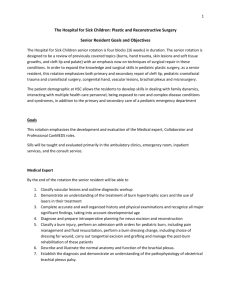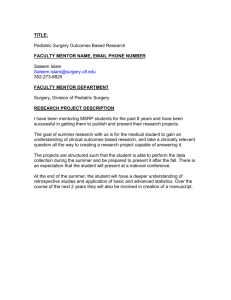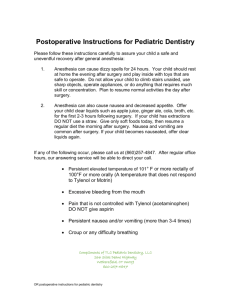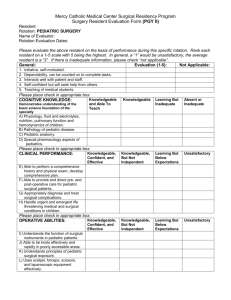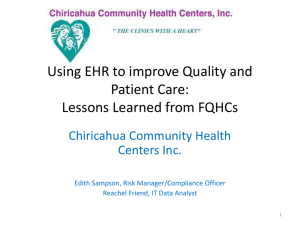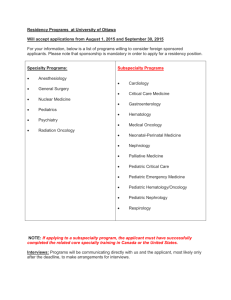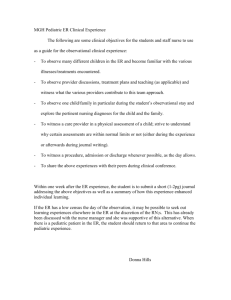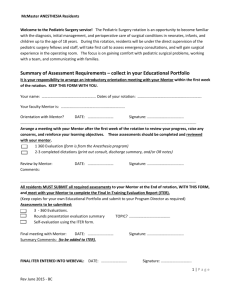The Hospital for Sick Children: Plastic and Reconstructive Surgery
advertisement
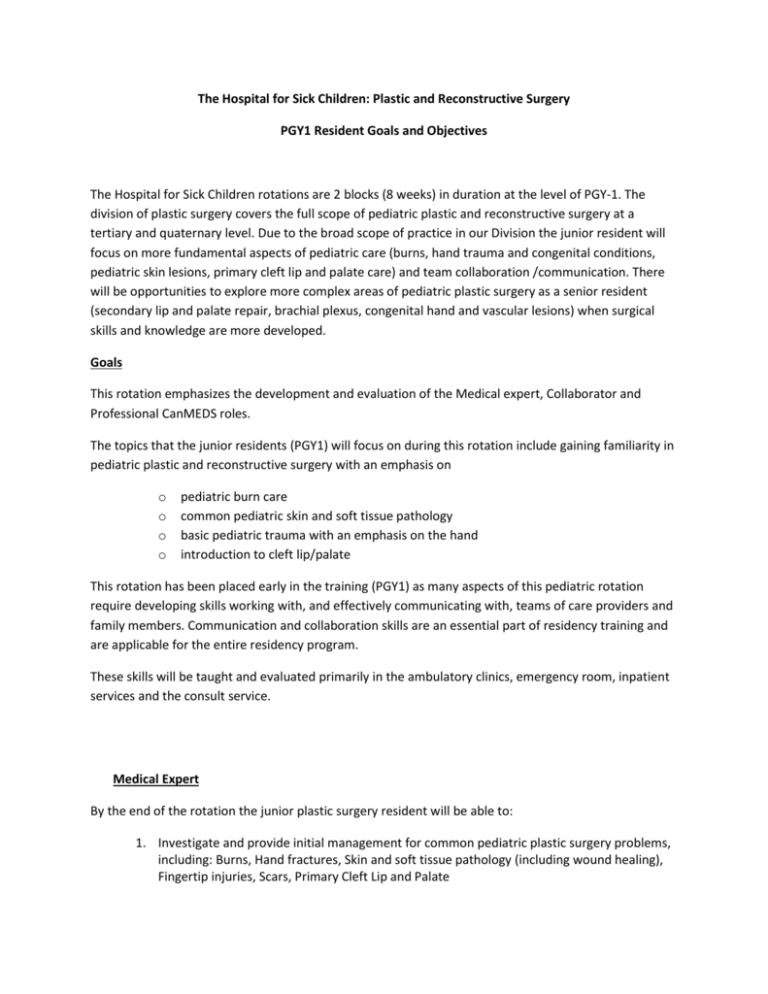
The Hospital for Sick Children: Plastic and Reconstructive Surgery PGY1 Resident Goals and Objectives The Hospital for Sick Children rotations are 2 blocks (8 weeks) in duration at the level of PGY-1. The division of plastic surgery covers the full scope of pediatric plastic and reconstructive surgery at a tertiary and quaternary level. Due to the broad scope of practice in our Division the junior resident will focus on more fundamental aspects of pediatric care (burns, hand trauma and congenital conditions, pediatric skin lesions, primary cleft lip and palate care) and team collaboration /communication. There will be opportunities to explore more complex areas of pediatric plastic surgery as a senior resident (secondary lip and palate repair, brachial plexus, congenital hand and vascular lesions) when surgical skills and knowledge are more developed. Goals This rotation emphasizes the development and evaluation of the Medical expert, Collaborator and Professional CanMEDS roles. The topics that the junior residents (PGY1) will focus on during this rotation include gaining familiarity in pediatric plastic and reconstructive surgery with an emphasis on o o o o pediatric burn care common pediatric skin and soft tissue pathology basic pediatric trauma with an emphasis on the hand introduction to cleft lip/palate This rotation has been placed early in the training (PGY1) as many aspects of this pediatric rotation require developing skills working with, and effectively communicating with, teams of care providers and family members. Communication and collaboration skills are an essential part of residency training and are applicable for the entire residency program. These skills will be taught and evaluated primarily in the ambulatory clinics, emergency room, inpatient services and the consult service. Medical Expert By the end of the rotation the junior plastic surgery resident will be able to: 1. Investigate and provide initial management for common pediatric plastic surgery problems, including: Burns, Hand fractures, Skin and soft tissue pathology (including wound healing), Fingertip injuries, Scars, Primary Cleft Lip and Palate 2. List and identify benign pediatric skin lesions and describe their treatment (e.g. spitz nevus, pilomatrixoma, nevus, hemangioma, pyogenic granuloma and nevus sebaceous) 3. Classify vascular lesions and outline basic diagnostic workup 4. Diagnose and list potential treatments for hypertrophic and keloid scars 5. Diagnose and excise a dermoid cyst 6. Interpret hand x-rays (hand fractures) correctly and demonstrate competence in local anesthesia and sedative techniques to perform closed reduction procedures 7. Perform a closed reduction of a hand fracture and manage a fingertip injury 8. Describe the anatomy of the hand relevant to pediatric traumatic injury 9. Diagnose and conduct the intraoperative planning for nevus excision and reconstruction 10. Discuss all basic aspects of pediatric burn injury, demonstrating knowledge of the principles of pediatric burn management. 11. Classify burn injury, perform an admission with orders for pediatric burn, including pain management and fluid resuscitation 12. Perform a burn dressing change, including making the most appropriate choice of dressing for wound, 13. Describe the pathophysiology, embryology and anatomy of the unilateral and bilateral cleft lip and palate 14. Diagnose and triage most pediatric hand trauma. 15. Diagnose and treat common pediatric soft tissue tumors and skin conditions 16. Demonstrate knowledge of the surgical techniques used for primary cleft lip and palate repair. Communicator By the end of the rotation the junior plastic surgery resident will: 1) Exhibit effective and timely verbal and written communication skills, including: communicating with both patients and families. 2) Establish a therapeutic relationship with patients and communicate well with the family. 3) Provide clear and thorough explanations of diagnosis, investigations and management in a professional manner. 4) Demonstrate empathy. 5) Obtain informed consent, providing sufficient information of the risks and benefits of the proposed procedure. 6) Write written orders, progress notes and consult notes are well organized and timely. Collaborator By the end of the rotation the junior plastic surgery resident will: 1) Participate effectively and appropriately in an inter-professional health care team, including personnel on the ward, clinic, emergency and operating room environments. 2) Recognize and demonstrates the use of the team members for the care and treatment of cleft lip and palate patients (cleft lip and palate coordinators), craniofacial (nurse coordinators) and burn care (nurse practitioner) 3) Consult and work effectively with other medical specialists, particularly the pediatric associates service and the emergency room physicians 4) Communicate well with the interprofessional staff that treat the children 5) Provide clear verbal presentations to health care team members (physicians, nurses, social work, therapists, speech pathology etc.) 6) Communicate with the health care team members concerning plans of care, including inpatient plans of care, follow up care and consultant services Manager By the end of the rotation the junior plastic surgery resident will: 1) 2) 3) 4) 5) Effectively contribute to the health care team. Delegate and distribute tasks fairly Use time wisely. Utilize information technology Effectively organize medical students during rotation Health Advocate By the end of the rotation the junior plastic surgery resident will: 1) Support the health of patients/families by providing appropriate referrals, support and information on health maintenance, as well as community/home resources. 2) Demonstrate an understanding of the use of the SCAN team as it relates to pediatric patients 3) Arrange appropriate follow up, including the use of telemedicine consultations for pediatric patients encountered in the emergency room Scholar By the end of the rotation the junior plastic surgery resident will: 1) Maintain and enhance professional activities through ongoing learning. 2) Demonstrate knowledge of the content of the most recent plastic surgery seminars relevant to the topics of burns, cleft lip and palate, embryology of the head and neck, pediatric skin lesions Professional The junior plastic surgery resident will: 1) Demonstrate a commitment to patients and their families, as well as to their profession and to society, through ethical practice. 2) Maintain and complete a procedural case log that accurately reflects the resident’s surgical experience.
